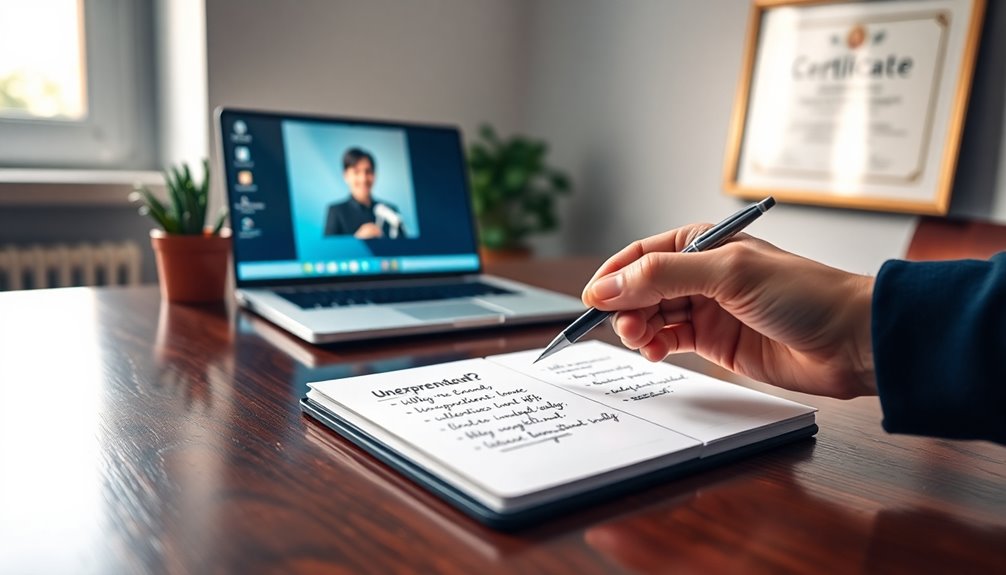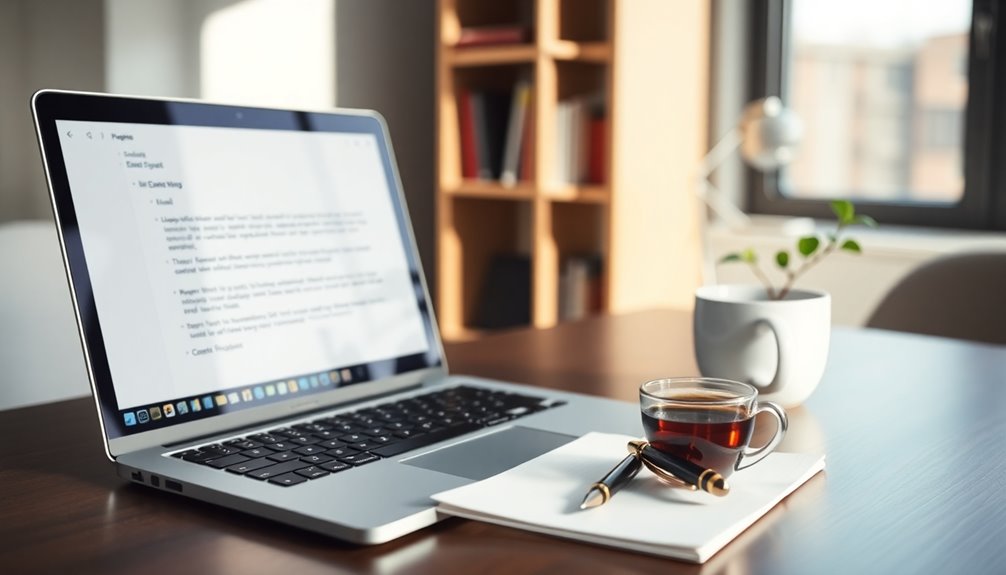When preparing for a receptionist interview, you should focus on key areas. Expect general questions about your motivation and previous feedback from employers. Be ready to showcase your experience in administrative support or customer service and any relevant software skills. Highlight your client interaction techniques, like how you build rapport and handle challenges. Multitasking and organizational abilities are essential, so mention tools you use to prioritize tasks. Don't forget to discuss your communication skills, as they reflect your professionalism and empathy. Stick around, and you'll uncover even more tips to ace your interview.
Key Takeaways
- Inquire about the candidate's previous employer feedback to gauge their performance and reliability.
- Assess the candidate's motivation for the receptionist role and alignment with company values.
- Explore the candidate's experience in administrative support, customer service, and familiarity with relevant software.
- Evaluate communication skills, focusing on active listening, clarity, and empathy in client interactions.
- Discuss organizational strategies and multitasking abilities, including task prioritization and use of scheduling tools.
General Receptionist Questions

When preparing for a receptionist interview, you'll likely encounter a variety of general questions that help the interviewer assess your fit for the role.
Expect inquiries about your previous employer's description of you, as well as your interest in the company and its values. Be ready to articulate your motivation for pursuing the receptionist position and the key characteristics that define a quality receptionist.
Additionally, they'll want to know about your interest in clerical work and what aspects appeal to you. These questions aren't just to gauge your experience; they help the interviewer understand your personality and how you align with the company culture.
Approach each question thoughtfully, showcasing your enthusiasm and readiness to contribute to the team.
Experience and Qualifications
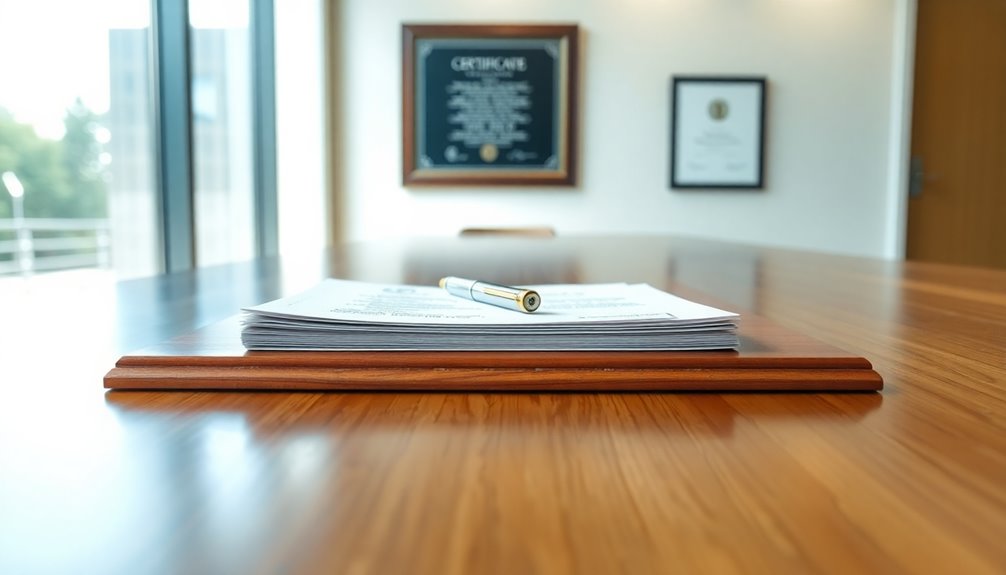
Highlighting your experience and qualifications is essential in a receptionist interview. You should emphasize any relevant background, such as previous roles in administrative support or customer service.
Mention specific software and programs you're familiar with, as this shows your technical capabilities. Be sure to discuss your organizational strategies, demonstrating how you manage tasks effectively in fast-paced environments.
If you have a history of working in diverse settings, share that, too. Your qualifications, whether certifications or courses, can set you apart from other candidates.
Finally, express your enthusiasm for the role and how your skills align with the company's needs. This approach will leave a lasting impression and showcase your readiness for the position. Engaging with effective learning techniques can also enhance your ability to adapt and thrive in the receptionist role.
Client Interaction Techniques

Your ability to interact effectively with clients can greatly enhance their experience and contribute to a positive office atmosphere. Start by greeting each client warmly, making eye contact, and using their name whenever possible. This personal touch builds rapport and shows you value them.
Practice active listening; pay attention to their needs and concerns without interrupting. When responding, use clear and concise language to guarantee they understand.
If a client is upset, remain calm and empathetic, acknowledging their feelings while working toward a solution.
Finally, maintain a professional demeanor, even during challenging interactions. By mastering these client interaction techniques, you'll create an inviting environment that encourages loyalty and satisfaction.
Multitasking and Organization
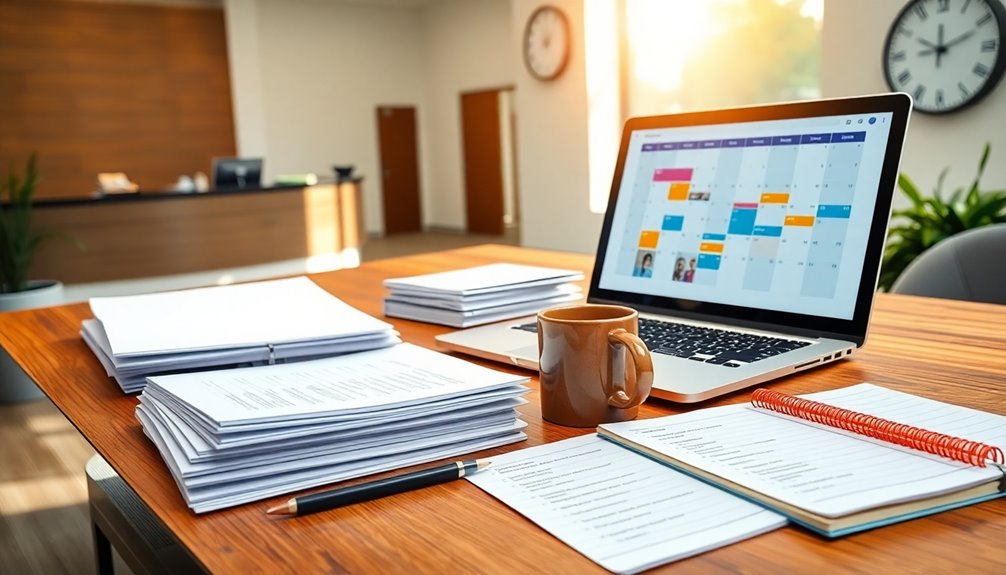
Effective multitasking and organization are essential skills for a receptionist, especially in a fast-paced environment. You'll often juggle phone calls, greet visitors, and manage schedules simultaneously. To excel, prioritize tasks and use organizational tools, like calendars or task lists, to keep everything on track. Here's a simple table to illustrate some effective strategies:
| Strategy | Description | Benefits |
|---|---|---|
| Prioritize Tasks | Identify urgent vs. non-urgent tasks | Enhances efficiency |
| Use Technology | Utilize software for scheduling | Saves time and reduces errors |
| Color-Coding | Assign colors to different tasks | Improves visibility and organization |
| Regular Check-ins | Review tasks periodically | Guarantees nothing is overlooked |
Stress Management Strategies

Managing stress in a receptionist role is just as important as multitasking and organization. When things get hectic, having effective strategies can help you maintain composure and productivity.
Here are some techniques you can use:
- Prioritize tasks: Identify what's urgent and tackle those items first.
- Take breaks: Step away for a few minutes to recharge your mind.
- Practice deep breathing: Use simple breathing exercises to calm your nerves.
- Stay organized: Keep your workspace tidy to reduce clutter-related stress.
- Seek support: Don't hesitate to ask colleagues for help when needed.
Communication Skills Overview

Strong communication skills are essential for a receptionist, as they serve as the first point of contact for clients and visitors. You need to convey information clearly and professionally, whether it's in-person, on the phone, or via email. Effective communication fosters a welcoming atmosphere and enhances client satisfaction.
Here's a quick overview of key communication traits:
| Skill | Importance | Impact |
|---|---|---|
| Active Listening | Builds trust and rapport | Clients feel valued and understood |
| Clarity | Reduces misunderstandings | Smooth interactions |
| Empathy | Helps in addressing concerns | Clients feel cared for |
| Professionalism | Reflects company values | Positive brand image |
Mastering these skills not only elevates your role but also contributes to a harmonious workplace.
Technology Use in Reception
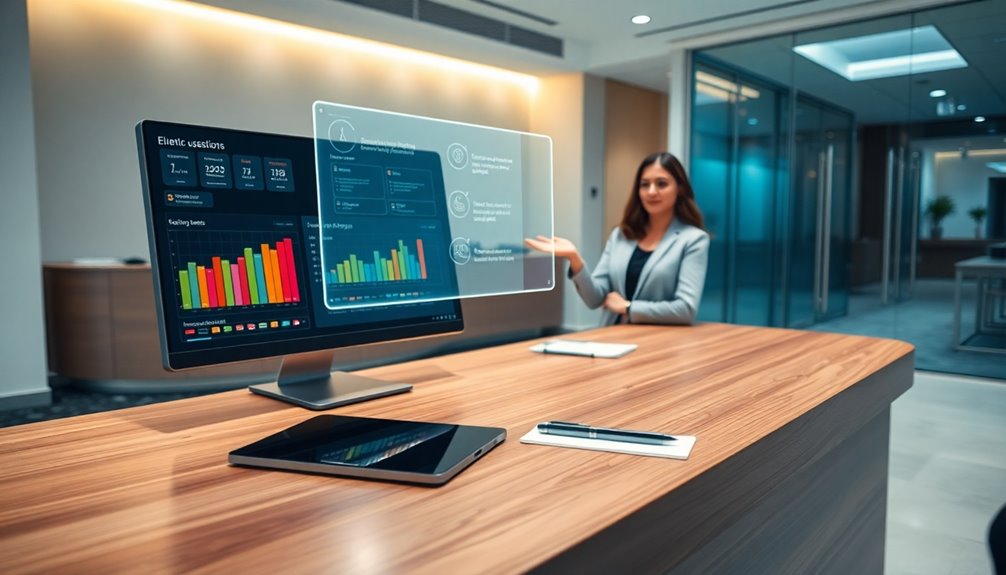
In today's fast-paced office environment, technology plays an essential role in the receptionist's daily tasks. You'll likely be expected to navigate various tools and software efficiently to support operations and enhance client interactions.
Here are some key technologies you should be familiar with:
- Office software: Proficiency in word processing and spreadsheets for reporting and documentation.
- Communication platforms: Familiarity with tools like email, chat, and conferencing apps to connect with colleagues and clients.
- Scheduling software: Using calendars and appointment systems to manage meetings effectively.
- Customer relationship management (CRM): Tracking client interactions and preferences for personalized service.
- Data entry systems: Inputting and managing information with accuracy to maintain organized records.
Embracing these technologies will make your role smoother and more effective.
Teamwork and Collaboration

While you may often be the first point of contact in an office, your role as a receptionist extends beyond individual tasks; it's about fostering teamwork and collaboration among colleagues. By supporting team goals and maintaining open communication, you help create a positive work environment. Here are some strategies to enhance collaboration:
| Strategy | Description | Benefit |
|---|---|---|
| Open Communication | Encourage team members to share ideas openly | Builds trust and respect |
| Conflict Resolution | Address issues calmly and constructively | Maintains team harmony |
| Support Team Goals | Align your tasks with team objectives | Enhances overall productivity |
Establishing clear communication is vital to ensuring that everyone is on the same page and working towards common goals.
Frequently Asked Questions
What Motivates You to Work in a Receptionist Role?
Your motivation to work as a receptionist stems from your love for interacting with people and creating a welcoming environment.
You enjoy being the first point of contact, ensuring clients feel valued and heard.
The dynamic nature of the role excites you, as it allows you to multitask and develop organizational skills.
Plus, you appreciate the opportunity to support a team, contributing to a positive atmosphere in the workplace.
How Do You Ensure Confidentiality in Your Work?
To guarantee confidentiality in your work, you should always handle sensitive information with care.
Use secure methods for storing documents, like locked cabinets or encrypted files.
When discussing client details, do it in private settings to avoid eavesdropping.
Be mindful of your surroundings and limit access to confidential areas.
Additionally, you can regularly update your passwords and stay informed about data protection practices to maintain a secure environment for both clients and colleagues.
What Qualities Make a Receptionist Stand Out?
To stand out as a receptionist, you've gotta demonstrate excellent communication skills and a friendly demeanor.
Your ability to multitask efficiently, while staying organized, is essential. Show your adaptability in handling unexpected situations and a knack for problem-solving.
Being proactive, maintaining confidentiality, and having a genuine interest in helping others can set you apart.
Finally, a positive attitude and a commitment to quality service can truly elevate your role in the office.
Describe a Time You Learned a New Software Quickly
Imagine diving into a pool for the first time; the initial shock quickly turns into excitement.
You faced a similar challenge when you learned a new scheduling software at your last job. With a little curiosity and determination, you explored its features, asking questions when needed.
Within days, you not only mastered it but also trained your colleagues, showcasing your adaptability and enthusiasm to embrace new tools in a fast-paced environment.
How Do You Handle Difficult Feedback From Supervisors?
When you receive difficult feedback from supervisors, stay calm and listen carefully.
It's essential to understand their perspective. Acknowledge their concerns and ask clarifying questions if needed.
Reflect on the feedback and identify areas for improvement. Instead of taking it personally, view it as an opportunity to grow.
Afterward, implement the suggested changes and follow up to show your commitment to improvement.
This proactive approach can strengthen your professional relationship.
Conclusion
To summarize, preparing for your receptionist interview can greatly boost your confidence and performance. Did you know that 70% of employers value a candidate's soft skills, like communication and organization, just as much as their technical abilities? By anticipating common questions and crafting thoughtful responses, you'll not only showcase your qualifications but also make a lasting impression. Approach the interview with enthusiasm, and you'll be well on your way to landing the role you desire!
Eugene brings a fresh, dynamic voice to our platform as one of our talented Writers. Specializing in research-driven content, he explores the latest findings in psychology and personal growth, translating them into actionable insights for our readers. Eugene’s work is fueled by a curiosity about what makes us tick and a desire to help others unlock their potential.

